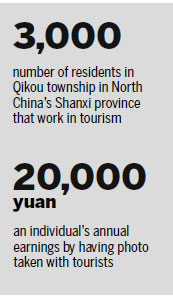Rural residents embrace changing way of life
Updated: 2018-08-17
TAIYUAN - Over the past six decades, Li Shixi, a rural resident from North China's Shanxi province, has experienced many changes in his life. He was once a poor farmer, but now he works in the tourism industry.
Li, 68, was born into an impoverished family in Qikou township in Luliang, an ancient dock on the Yellow River, China's second-longest. He helped his parents, who were farmers, when he was young. However, he didn't want to become a farmer.
Li left school and moved from the poor rural area to the city of Taiyuan, capital of Shanxi, to get a job, like hundreds of thousands of others who left their hometowns and flocked to the cities.
"I was a loader in a heavy machinery plant. But it was a temporary job and I earned very little. So I decided to go home," Li said.
After about five years in the city, Li returned to Qikou. He planted crops in the fields and sold dates and potatoes in nearby villages before becoming a barge hauler.
Cargo ships from the northern and western regions in the upper reaches of the Yellow River docked in Qikou when violent rapids and dangerous reefs halted their journeys south and east.

"There are fewer ships since more roads and railways have been set up. The once busy gateway gradually lost its function and finally died," Li said.
With the loss of his livelihood, Li sought a new way to make money.
As part of a national rural revitalization strategy, efforts have been made to develop agriculture and improve conditions in rural areas and rural residents' lives.
The government of Luliang attaches great importance to the development of traditional culture. Li and other barge haulers have been identified as inheritors of intangible cultural heritage because of their professional experience dragging boats. They have been invited to give paid performances and show local customs.
Due to its important historical status and unique scenery, the ancient town has seen an increasing number of historians, photographers and painters visiting.
In addition, the local government has invested heavily to protect and repair ancient buildings in the town, making Qikou even more popular with tourists.
Li offered his cave dwelling to a camera crew once when all the hotels in the town were fully booked.
"They gave me 2,000 yuan ($291). It was a large sum of money 20 years ago," said Li, who later mobilized his neighbors to turn their cave homes into guesthouses.
"Poor farmers could not afford to run hotels, but now it's a new way for them to increase their income. Nowadays, we see an increasing number of tourists visiting rural areas every weekend and on holidays," he said.
The number of visitors to Qikou increased from 100,000 in 2015 to 500,000 in 2017. Currently, 3,000 residents, or one-tenth of the population, work in tourism.
Meanwhile, Li has found another way to make money by playing small roles in TV series and films.
The old man often dresses as a local shepherd - with a white towel wrapped around his head and a long-stemmed tobacco pipe pinned on a short goatskin coat.
At the Qikou ancient dock site, Li is always an eye-catching character. Tourists pay to take his photo.
"Farm work was barely profitable and very laborious. But now, I can make money quickly and easily by posing for photos, just like a model," Li said.
Li's story is not unique. Thousands of farmers have seen their careers evolve over the past decades as huge changes took place in the country.
"New identities bring us new lives," said Zhang Guobao, a man in his 70s who poses for photographs with his donkey at the Hukou Waterfall scenic area, the largest waterfall on the Yellow River.
Zhang said he can earn about 20,000 yuan every year by having his photo taken with tourists.
"I used to be a migrant worker in big cities. I couldn't make much money and I had to leave my children at home. I'm so glad that I can earn money here in my hometown," he said.
(China Daily 08/17/2018 page16)



